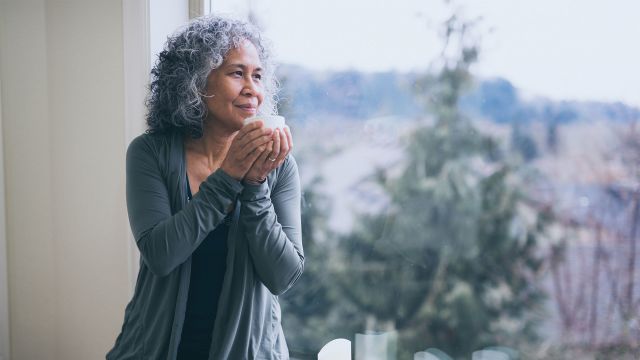Updated on June 20, 2023.
While some people experience only minor symptoms of menopause, the vast majority—an estimated 80-85 percent—will experience hot flashes, night sweats, and sleep issues that can get in the way of enjoying daily life. The menopause transition typically starts between the ages of 45 and 55, when the ovaries start producing less and less of the hormones estrogen and progesterone. You’re considered in menopause when you haven’t had a menstrual cycle for 12 months in a row.
If you’re experiencing uncomfortable symptoms of menopause, which can also include vaginal dryness, brain fog, mood swings, and depression, talk to your healthcare provider (HCP) about solutions, says Jeremiah McNamara, MD, an OBGYN with Sky Ridge Medical Center in Lone Tree, Colorado.
Treatment can include prescription menopausal hormone therapy (MHT)—sometimes called hormone replacement therapy (HRT) or hormone therapy (HT). HT is considered safe to use for up to 10 years following your final menstrual period. It’s most effective for people with severe signs of menopause.
If, however, your signs are mild to moderate and you prefer not to use medication, there are several natural remedies that may help.
Practice mindfulness
Mindfulness is the practice of intentionally focusing your attention on the present moment. The goal is to become aware of your senses and how you’re feeling, and to let any thoughts or emotions attached to your experience pass without judgment. The practice has been linked to reductions in stress and anxiety as well as better pain management. Research from the Mayo Clinic suggests mindfulness could also help alleviate some signs of menopause.
Researchers surveyed more than 1,740 women between 40 and 65 years about their menopausal symptoms, daily stress, and level of mindfulness. They found that those who reported being more mindful tended to have fewer symptoms of menopause. The link between greater mindfulness and reduced signs of menopause was particularly notable among the study participants who reported more stress.
The study, published in 2019 in the journal Climacteric, doesn’t prove a cause and effect relationship, but it does suggest that practicing mindfulness could be a natural and noninvasive way for people experiencing menopause to manage anxiety and ease some symptoms.
To add more mindfulness into your day, try these strategies:
- Focus on your breath, especially when you're experiencing negative thoughts or emotions
- Pay attention to the sights, smells, or sounds around you
- Notice the joy in simple acts, like cooking or eating
Consider certain foods and supplements
Making some changes in the types of food you eat may have some effect on symptoms of menopause. Research suggests that eating a well-balanced diet including vegetables, fruits, fiber, and whole grains, may help reduce signs such as night sweats and hot flashes. Adding foods rich in phytoestrogens (plant-based estrogens)—such as soy, chickpeas, lentils, and flaxseeds—may also help. Keep in mind that more research is needed to prove the benefit of phytoestrogens, says Dr. McNamara.
Supplements such as red clover, evening primrose oil, black cohosh, and flaxseed may also ease signs of menopause, says McNamara, who cautions that you should always check with your HCP before trying any supplements. Some supplements may pose potential safety issues or interact with your current medications. He also suggests trying supplements one at a time, and always buying them from a reputable company.
“A lot of people do report some degree of improvement in their symptoms with these options, but many large, well-designed scientific trials have failed to show a significant measurable benefit compared to placebo,” he says.
To improve hot flashes, avoid spicy foods like curry, hot sauce, and peppers, McNamara advises. Some people might also find that coffee and alcohol can trigger hot flashes.
Move every day
One of the best ways to ease symptoms of menopause is to stay physically active. Not only can it keep your bones strong and help you maintain a healthy weight (which can reduce hot flashes), but research suggests that people with a sedentary lifestyle often have more severe signs of menopause, says McNamara.
Regular exercise—even if it’s just a nightly walk after dinner—may also help relieve stress and anxiety that commonly occur with menopause.
Most healthy adults should aim for a minimum of 150 minutes of moderate-intensity aerobic activity or 75 minutes of more vigorous exercise each week, according to the U.S. Department of Health and Human Services (HHS). You should also do some muscle-building activities, like push-ups, weight training, or gardening, at least two days each week. Staying active becomes more and more important as you age.
Older adults should also incorporate balance-training exercises, like walking backwards and standing on one leg, into their weekly routines. Keep in mind that even short bursts of activity—such as a two-minute walk—can help improve your health.
Work on better sleep habits
A good night’s sleep can seem particularly elusive as you go through the menopause transition, but practicing good sleep hygiene can help, says McNamara. “The quality of sleep decreases dramatically during menopause, and the lower your sleep quality, the lower your threshold for anxiety and other conditions as well,” he explains. To get more restful sleep:
- Turn off your TV and cellphone when you get into bed.
- Wake up and go to sleep at the same time every day.
- Make sure your room is cool, dark, and quiet.
- Avoid caffeine, alcohol, and nicotine before bed.
As you go through the menopause transition, keep an ongoing conversation with your HCP about how you’re feeling, advises McNamara, and remember that you don’t have to live with discomfort.






